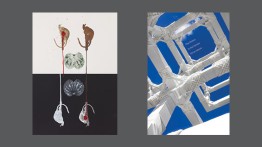Public Art Fund Virtual Talks: "Global Positioning" Panel with Sean Connelly and Rosana Paulino
Thursday, April 21, 2022, 6 - 7pm

Sean Connelly, 16 Cube Truss (About Building Systems), 2021. Digital print. Courtesy Sean Connelly, After Oceanic.
Rosana Paulino, Jogo perigoso (Dangerous Game), 2021. Collage, monotype and acrylic on paper. Courtesy of Mendes Wood DM, São Paulo and the artist.
Commissioned by Public Art Fund for Global Positioning, an exhibition on 320 JCDecaux bus shelters across New York City, Chicago, and Boston, on view from January 26, 2022—June 5, 2022.
On April 21, join artists Sean Connelly (Honolulu, Hawai‘i) and Rosana Paulino (São Paulo, Brazil) via Zoom for a conversation with Associate Curator Katerina Stathopoulou. The artists will discuss themes of indigenous culture, tradition, and the environment through the lens of their newly-commissioned works for Global Positioning, an exhibition on 320 JCDecaux bus shelters in New York City, Boston, and Chicago through June 5.
The conversation with Connelly, and Paulino will explore how they address the impacts of the COVID-19 pandemic through their contributions to the exhibition. Each will discuss how their practice is an expression of their heritage, a tool to respond to current conditions, and what it means for their artwork to be exhibited alongside 20 artists from 17 countries across six continents. Together, Global Positioning and this free public program help us consider the role of public art as we process this turbulent period with a blend of thoughtfulness, hope, incisiveness, and wit.
Register to watch virtually for free.
Public Art Fund Talks are presented in partnership with The Cooper Union
About the Artists
Sean Connelly (b. 1984, O‘ahu, Hawai‘i; lives in Honolulu, Hawai‘i) is a geomancer working as an artist, sculptor, design theorist, and grassroots architectural historian. As a next-generation, activist-driven design practitioner and expert witness, Connelly is fluid among the realms of architecture, landscape, infrastructure, and art. Their work includes new media, land art, film, cartography, building design, data analysis, social practice, and more. Connelly works to repair the impacts of settler colonialism, militarization, and climate change today. Connelly maintains an aesthetic and egalitarian vision to help advance the recovery of Native, oceanic, and holographic futures with a focus that is ecological, economic, and technologic in scope. From building to cosmos—Connelly approaches material, information, energy, and time as biocultural, planetary entities that we have evolved to honor and replicate. Connelly’s interest strives to connect community in dismantling architectures that oppress indigenous ecology and ways of knowing. Connelly is represented by After Oceanic, and co-directs the non-profit Hawai‘i Non-Linear, whose mission is to create art and architecture for ‘āina.
Rosana Paulino’s (b. 1967, São Paulo, Brazil; lives in São Paulo, Brazil) work centers around social, ethnic, and gender issues, focusing in particular on black women in Brazilian society and the various types of violence suffered by this population due to racism and the lasting legacy of slavery. Paulino explores the impact of memory on psychosocial constructions, introducing different references that intersect the artist’s personal history with the phenomenological history of Brazil, as it was constructed in the past and still persists today. Her research includes the construction of myths – not only as aesthetic pillars but also as psychic influence-makers. Paulino – whose artistic output is unquestionably fundamental to Brazilian art – has produced a practice of reconstructing images and, beyond that, reconstructing memory and its mythologies. Her body of work brings together female figures and their respective historical elements, supported by psychic traces that map colonial structures and their impact onto the social and aesthetic fabric of our time.
About the Talks
Public Art Fund Talks, organized in collaboration with The Cooper Union, connect compelling contemporary artists to a broad public by establishing a dialogue about artistic practices and public art. The Talks series feature internationally renowned artists who offer insights into artmaking and its personal, social, and cultural contexts. The core values of creative expression and democratic access to culture and learning shared by both Public Art Fund and The Cooper Union are embodied in this ongoing collaboration. In the spirit of accessibility to the broadest and most diverse public, the Talks are offered free of charge.




